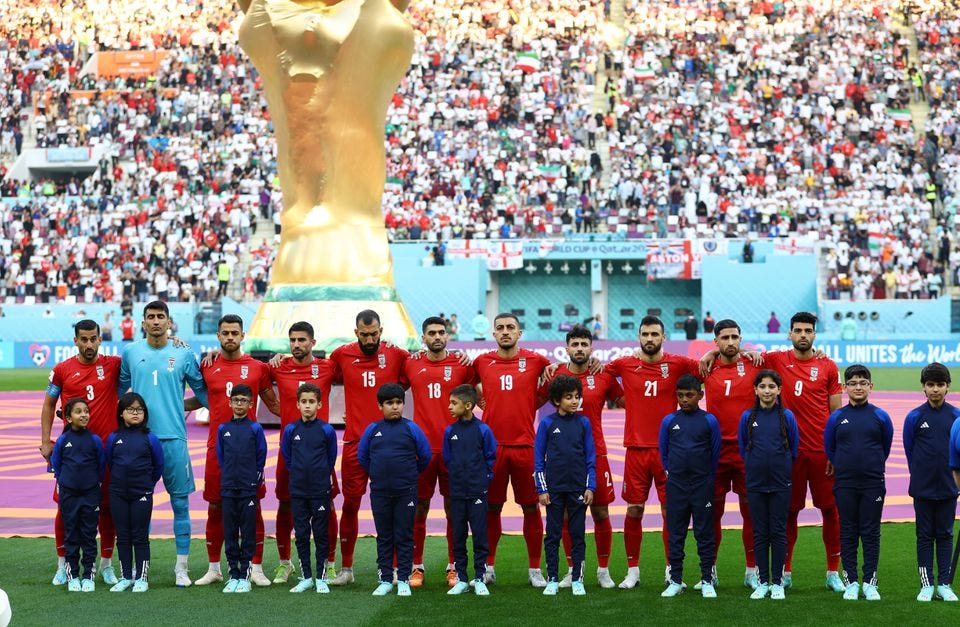
It did not take much. The initial promises of protest from a number of footballers and their teams at the Qatar FIFA World Cup were always suspect and hollow. There was Denmark’s less than impressive form of camouflaged protest via merchandise, supposedly defiant with its logo free monochrome colours. There was the barely threatening promise that armbands about love would be worn.
Then came Australia’s own uniquely celluloid performance: videos from the players claiming sympathy with the various efforts made by Qatar in improving the record on human rights in various areas yet frowning about the fact that more could be done.
From the moment the first ball was kicked, even these feeble efforts were bound to be found wanting. FIFA President Gianni Infantino made his position clear from the outset, playing the role of defender of the Qatari state and mocking detractors for obsessing with such niggling things as human rights.
In a letter sent to all 32 participating teams at the start of this month, Infantino and secretary general Fatma Samoura wrote that football, despite acknowledging that it did “not live in a vacuum” should not be “dragged into every ideological or political battle that exists.” The organisation tried “to respect all opinions and beliefs, without handing out moral lessons to the rest of the world. No one people or culture or nation is ‘better’ than any other.”
Having pretended to relativise all such positions, thereby making protest essentially meaningless, Infantino and his apparatchiks were keen to press home the point that footballers needed to focus on the ball. Gestures of protest on the pitch would not be tolerated—except through officially sanctioned FIFA channels.
Of particular interest were hardly earth-shattering threats that the captains of a number of sides would be wearing “One Love” armbands. Various national football federations baulked, noting that FIFA had “been very clear that it will impose sporting sanctions if our captains wear the armbands on the field of play.”
The national federations could not put their “players in a position where they could face sporting sanctions including bookings, so we have asked the captains not to attempt to wear the armbands in the FIFA World Cup games.” The bureaucrats behind the joint statement, in a weak effort to save face, insisted that they would have paid the fines normally applicable “to breaches of kit regulations and had a strong commitment to wearing the armband. However, we cannot put our players in a position where they might be booked or even forced to leave the field of play.”
The teams of England, Wales, Belgium, Switzerland, Germany, Denmark and The Netherlands, duly complied, falling nine pins. It really was just about the football. Prior to their opening match against Iran, it had been reported that England’s captain Harry Kane would be braving the unsanctioned arm band. He barely managed that. Former Manchester United player Roy Keane offered his two bits worth by suggesting that Kane and his team should have done it for the first game and accepted the punishment. “Take your medicine and in the next game move on. You don’t wear it because you don’t want to get suspended but, I think it was a big mistake because both players—Wales and England—should have stuck to their guns and done it.”
What FIFA got was exactly what it wanted: cowed teams and captains who would wear only approved protesting apparel. In a statement dated November 21, the organisation confirmed that “its No Discrimination campaign has been brought forward from the planned quarter-finals stage in order that all 32 captains will have the opportunity to wear this armband during the FIFA World Cup Qatar 2022.”
While this was a victory chalked up to the grey suits in Zürich, other forms of protest had more serious implications. In the case of the Iranian team, the stakes were far more serious. Not singing the Iranian anthem in the first match in solidarity for protestors back in Iran was not a gesture appreciated by the clerical authorities. But then again, some Iranian spectators have been less than impressed by a perception that the team is not supportive enough for the cause back home. As a result, the side known as Team Melli has been given another name: Team Mullah.
Iran’s footballers have come fair game and are being subjected to something a bit more serious than yellow cards and on field scolding. A number of arrests have been made against figures supposedly sympathetic to the protests. The footballer Voria Ghafouri was recently arrested for allegedly “insulting and sabotaging” the country’s team and spreading “propaganda against the regime”.
Besieged and beleaguered, the plight of the players has left the coach, Carlos Queiroz, incensed. “To those who come to disturb the team with the issues that are not only about the football opinions,” he told a news conference, “they’re not welcome because our boys, they’re just simple football boys.”
While sounding a tad condescending, Queiroz revealed an understanding paternalism that sees the tie between ball and player as the only relationship that really matters. “Let the kids play the game. Because this is what they’re looking for. The wanted to represent the country, to represent the people, as any other national team that [is] here. And all the national teams, there are issues at home.”
The perennial issue: let footballers be footballers and leave the politics and moralising to those off the pitch. To FIFA and the Qatari authorities, this must sound like the sweetest of music.




Protest becomes more effective for being rare. When athletes are always protesting something, they might as well protest nothing.